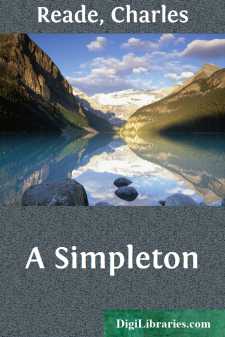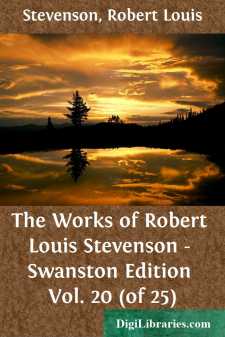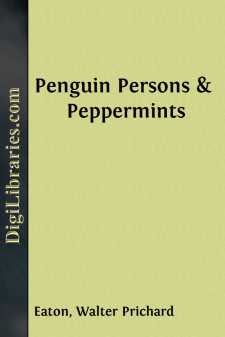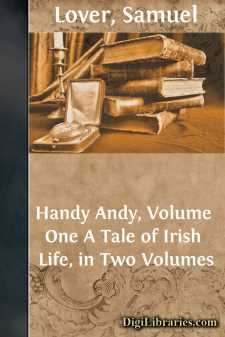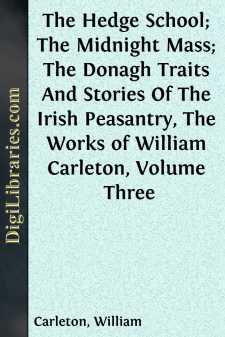Literary Collections
- American 84
- Ancient, Classical & Medieval 14
- Asian 1
- Australian & Oceanian 1
- Canadian 55
- Continental European 121
- English, Irish, Scottish, Welsh 179
- Essays 160
- General 24
- Letters 46
- Middle Eastern 1
Literary Collections Books
Sort by:
by:
Henry Van Dyke
DAYS OFF "A DAY OFF" said my Uncle Peter, settling down in his chair before the open wood-fire, with that air of complacent obstinacy which spreads over him when he is about to confess and expound his philosophy of life,—"a day off is a day that a man takes to himself." "You mean a day of luxurious solitude," I said, "a stolen sweet of time, which he carries away into some...
more...
by:
Bret Harte
CHAPTER I The bell of the North Liberty Second Presbyterian Church had just ceased ringing. North Liberty, Connecticut, never on any day a cheerful town, was always bleaker and more cheerless on the seventh, when the Sabbath sun, after vainly trying to coax a smile of reciprocal kindliness from the drawn curtains and half-closed shutters of the austere dwellings and the equally sealed and hard-set...
more...
by:
Charles Reade
CHAPTER I. A young lady sat pricking a framed canvas in the drawing-room of Kent Villa, a mile from Gravesend; she was making, at a cost of time and tinted wool, a chair cover, admirably unfit to be sat upon—except by some severe artist, bent on obliterating discordant colors. To do her justice, her mind was not in her work; for she rustled softly with restlessness as she sat, and she rose three...
more...
A TALE OF A LION RAMPANT It was in the month of May 1813 that I was so unlucky as to fall at last into the hands of the enemy. My knowledge of the English language had marked me out for a certain employment. Though I cannot conceive a soldier refusing to incur the risk, yet to be hanged for a spy is a disgusting business; and I was relieved to be held a prisoner of war. Into the Castle of Edinburgh,...
more...
It is not a little unfortunate that no one can attempt the essay form nowadays, more especially that type of essay which is personal, reminiscent, “an open letter to whom it may concern,” without being accused of trying to write like Charles Lamb. Of course, if we were ever accused of succeeding, that would be another story! There is, to be sure, no doubt that the gentle Elia impressed his form and...
more...
CERES’ RUNAWAY One can hardly be dull possessing the pleasant imaginary picture of a Municipality hot in chase of a wild crop—at least while the charming quarry escapes, as it does in Rome. The Municipality does not exist that would be nimble enough to overtake the Roman growth of green in the high places of the city. It is true that there have been the famous captures—those in the Colosseum,...
more...
by:
Samuel Lover
CHAPTER XXII The night was pitch dark, and on rounding the adjacent corner no vehicle could be seen; but a peculiar whistle from Dick was answered by the sound of approaching wheels and the rapid footfalls of a horse, mingled with the light rattle of a smart gig. On the vehicle coming up, Dick took his little mare, that was blacker than the night, by the head, the apron of the gig was thrown down, and...
more...
by:
Samuel Lover
ADDRESS I have been accused in certain quarters, of giving flattering portraits of my countrymen. Against this charge I may plead that, being a portrait-painter by profession, the habit of taking the best view of my subject, so long prevalent in my eye, has gone deeper, and influenced my mind:—and if to paint one's country in its gracious aspect has been a weakness, at least, to use the words of...
more...
BEETHOVEN'S LETTERS. 216.TO STEINER & CO. The Adjutant's innocence is admitted, and there is an end of it! We beg you to be so good as to send us two copies in score of the Symphony in A. We likewise wish to know when we may expect a copy of the Sonata for Baroness von Ertmann, as she leaves this, most probably, the day after to-morrow. No. 3--I mean the enclosed note--is from a musical...
more...
by:
William Carleton
THE HEDGE SCHOOL. There never was a more unfounded calumny, than that which would impute to the Irish peasantry an indifference to education. I may, on the contrary, fearlessly assert that the lower orders of no country ever manifested such a positive inclination for literary acquirements, and that, too, under circumstances strongly calculated to produce carelessness and apathy on this particular...
more...




